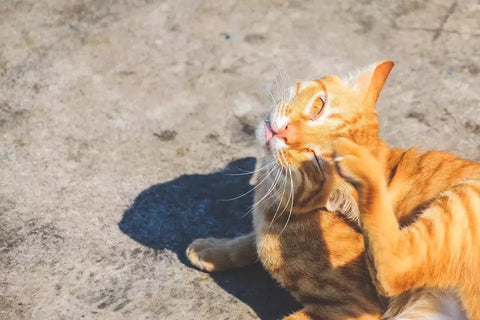Cat asthma is possible and turns out humans are not the only ones that can suffer from this disease. As a matter of fact, cat asthma is one of the most common and can be one of the most life-threatening respiratory diseases in cats. According to Purina, asthma has been diagnosed in about about 1% to 5% of cats, mostly around 4 to 5 years old.
In this article, we have come up with the most basic yet important things you should note about cat asthma, its signs & symptoms, cat asthma treatment & management, and ways to help prevent an asthma attack.
"Cat asthma is often clinically referred to as the narrowing of your cat’s inflamed airways."
What is Cat Asthma?
Cat asthma is often clinically referred to as the narrowing of your cat’s inflamed airways, as a result of the immune system reacting to an allergen. A number of experts believe that cat asthma may be hereditary, but there is still no final conclusion to that. The general agreement for this is that if a cat has asthma, it may be caused by a number of factors found in the environment. According to the College of Veterinary Medicine of Cornell University, even though there are some discussions about what cat asthma is, most professionals acknowledge that it is prompted by inhalation of allergens.
When your cat inhales an allergen for the very first time, their immune system produces antibodies that will fight against it. If your cat happens to inhale it again, their immune system will be able to recognize it. The immune system will prompt the production of substances that causes inflammation, which results in swelling, irritation, and tightening of the airways. This is what causes breathing difficulties for your cat as the ability of air to move freely in the airways is limited.
What Causes Asthma in Cats?
A cat asthma attack can be triggered by these allergens:
- Pollen
- Dust mites
- Cat litter dust
- Grass
- Mold
- Lawn fertilizers
- Home cleaning products, like bleach
- Flea powders
- Cigarette smoke
- Vehicle smoke
- Certain pet foods
- Pet food, as food allergy is also a consideration; corn, soy, beef, and fish can be triggers
Various underlying health conditions, like cough, colds, obesity, pre-existing heart issues, or pneumonia, may worsen your cat's asthma attacks.
Cat Asthma Symptoms
The symptoms of cat asthma are pretty similar to asthma in humans where struggling to breathe is always the first and most noticeable sign of an asthma attack. You may also observe that your cat is holding their neck out straight with their head very close to the ground or floor. Some other usual signs of an asthma attack in cats include:
- Open-mouth breathing
- Rapid breathing while asleep; Animal Emergency Center notes that cats take 24 to 30 breaths when at rest or at sleep, 40 breaths and above may mean a cat asthma attack and is an emergency!
- Persistent gagging or coughing
- Foaming mucus while coughing
- Wheezing
- Weakness
- Pale blue gums and lips
Treatment and Management
There is no known cure for asthma but there are experimental therapies that include supplementation of Omega-3 fatty acids and desensitization to certain allergens (like allergy shots in humans). However, additional analysis is needed to sharpen them and verify the safety and efficacy of these courses of action.
Your vet may also prescribe Corticosteroids and Bronchodilators. Corticosteroids help reduce airway inflammation and are available in oral, inhaled, and injectable forms. Bronchodilators expand airways that have become too narrow and are considered very essential during attacks.
However, even if there is no cure for cat asthma at the moment, asthma attacks can still be managed and prevented efficiently.

Consult your vet as soon as early symptoms develop
As soon as you notice early signs of asthma in your cat, like breathing difficulties, talk to your vet as soon as possible. Whatever your vet diagnosis will prevent problems from getting worse.
Stay away from possible allergens
Identifying what triggers your cat’s asthma can be harder than you thought. Some of the best ways to prevent your cat from having asthma attacks are by doing these simple home care methods:
- Avoid using home deodorizers
- Vacuum and change air filters regularly to help keep the air at home clean
- Make sure nobody smokes inside your house
- Keep your cat away from smoke from cigarettes, fireplace, and vehicles
- Supervise your cat when letting them play outside
- Stay away from using very strong-scented household products and perfumes
- Clean your house more frequently
Keep track of the irritants
Have time to list all the possible allergens present inside and outside your house, then write down any noticeable asthma-like changes you observe in your furbaby. This process may take some time but this will help you identify which of these substances are causing your cat’s asthma attacks and you can begin stirring clear of them.
Use cat wipes
Most cats do not get regular baths and instead groom themselves. But, cat dander can accumulate along with environmental irritants to worsen asthma. So, you can use Pet WiPees™ Cat All Purpose wipes all over your cat including paws and hard to reach places like their back.

Use low-dust cat litters
Dust can be a possible allergen for your furbaby’s asthma. Clay-based litters are not advisable if your furbaby has respiratory problems. Instead, use dust-free, unscented cat litter. Talk to your vet about this.
Provide diapers and pads
The strong urine odor from accidents and urine spraying made by your cat may also be asthma irritants. To help prevent tracking urine around your home, take Pawtect® Pads and place them under litter boxes so that there will be no mess just in case your cat misses.
Involve everyone
Involving the whole family in making sure your cat is prevented from having asthma attacks is exciting. It's important that other family members, too, feel responsible in giving your asthmatic cat a healthy home environment and the best life possible.
Cat asthma can range from being mild to life-threatening. But even if it has no cure, it can still be managed by keeping a keen eye on respiratory changes, successfully by making household changes, and consulting your vet regularly. With management done right, your cat will be able to live a happier and healthier life even with asthma.
"To help prevent tracking urine around your home, take Pawtect® Pads and place them under litter boxes so that there will be no mess."









